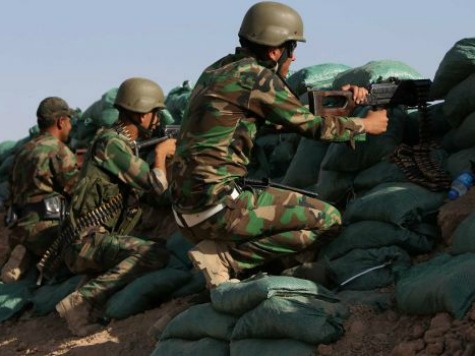While Iraqi government officials continue to claim that they are making advances in defeating the jihadist group Islamic State of Iraq and al-Sham (ISIS), Kurdish forces on the ground report that ISIS has begun to slowly isolate Baghdad, targeting cities in the Sunni north as well as Shi’ite south.
An extensive McClatchy report quotes several Kurdish military leaders who are significantly concerned that Baghdad could fall to ISIS. At least two critical towns that hold a supply route to Baghdad have been captured, they reported, and ISIS appeared to be traveling south to capture routes on the other side of the capital.
Jabbar Yawar, the spokesman for the Kurdish peshmerga militia, told McClatchy that ISIS was reportedly six miles from Baghdad at times. “This area controls access to southern Iraq, and it appears as if they might try to push into Baghdad or even south towards the city of Hilla,” he stated.
ISIS moving south of Baghdad is significant because of strongholds they already possess in Anbar province, to the west, and their initiatives to control the north. They have also been moving ISIS jihadists east to attempt to cut off the remaining roads to the city.
The Kurdish peshmerga forces reportedly are the biggest force standing between ISIS and a complete control of Iraq, as many Iraqi soldiers have either been killed in mass executions or deserted. Kurdish areas have remained largely in peace, and ISIS has rarely clashed with peshmerga forces directly. Nonetheless, the Kurdish forces appear to have little interest in collaborating with the government of Prime Minister Nouri al-Maliki, instead aiming to sever their territory from Iraqi sovereignty.
The Iraqi government has largely denied many of ISIS’s gains in the country. According to CNN, the Iraqi government claims they still control the nation’s largest oil refinery in Baiji after reports surfaced that ISIS jihadists had taken it over. Deputy Prime Minister for Energy Affairs Hussain al-Shahristani said in a statement that the Iraqi army is not in full control of the oil refinery but continues to fight and is slowly encircling it. Iraqi state media also claims the army has killed the jihadist allegedly leading the attack on Baiji, Abu Qutada.
Kurdish leaders told McClatchy that they, too, were told Iraqi forces were still fighting in Baiji and had not fully lost control of the refinery.
While the Kurds continue to fight ISIS and remain the most organized and feared military in Iraq, the United States government is urging Kurdish leaders to abandon dreams of sovereignty. During a visit to Iraqi Kurdistan this week, Secretary of State John Kerry urged Kurdish leaders to promote national unity and participate in the Iraqi government.

COMMENTS
Please let us know if you're having issues with commenting.